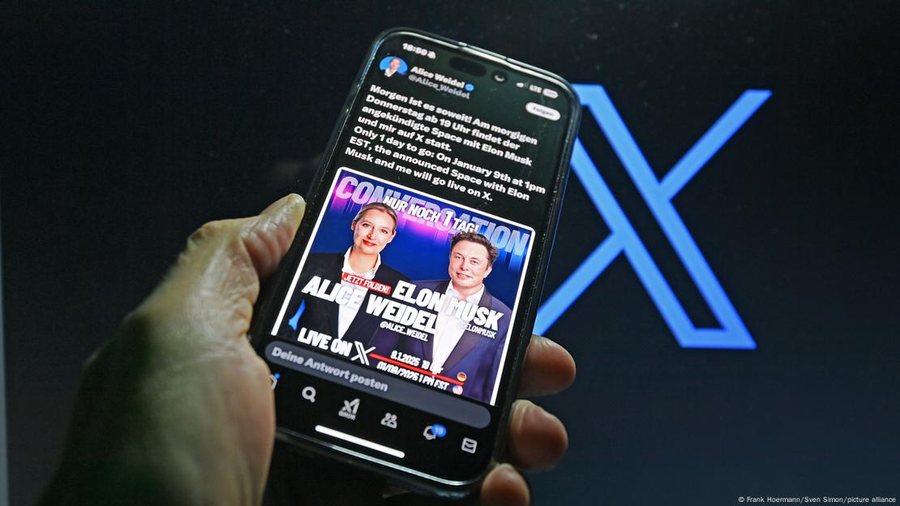
Romania repeats presidential election over alleged Russian influence on TikTok; on platform X, Elon Musk advertises for the AfD. Is social media changing democracy?
Parliamentary elections will take place in Germany on February 23, 2025. For the multi-billionaire and confidant of Trump, Elon Musk, it is clear that the parliamentary elections should be won by the AfD, the party which is partly classified by the German Federal Office for the Protection of the Constitution as right-wing extremist. Only the AfD can save Germany, Musk wrote on his Internet platform X. He also offered AfD leader Alice Weidel the opportunity to hold a discussion on the X platform. On German social media, the AfD is regarded as the most active party, especially on the Chinese social media platform TikTok. Videos with AfD positions are seen on TikTok by hundreds of thousands.
According to political and communication expert Johannes Hillje, in 2022 and 2023 each AfD video was viewed on average more than 430,000 times. For comparison: in second place are the videos of the conservative parliamentary group CDU/CSU – with an average of around 90,000 views.
Does social media favor right-wing parties?
No, says Andreas Jungherr, professor of Political Science and Digital Transformation at the Otto-Friedrich University in Bamberg. "The AfD has been active on social media for a long time." She has learned which approach works there.
This is a clear advantage in terms of reach – but that alone does not guarantee electoral success, says Jungherr. This is clearly seen in the campaign of US presidential candidate Kamala Harris, who had great success on social media. But as we know, this was not enough to bring her to the White House.
What impact does social media have on values and beliefs?
So-called "filter bubbles" arise in the online space because search results or content are personalized. Algorithms of online service providers determine what is shown to us online. In social media an algorithm gives priority to the content of popular personalities or content that many other users have liked or commented on. On the other hand, the algorithm may no longer display certain contents at all, if they have been frequently ignored.
This creates a one-sided perspective: one's worldview is reinforced, while the opinions or views of others are ignored. Above all, such content reinforces the values and beliefs one currently holds.
This is why media of all kinds have only a very small influence on voter decisions, says Judith Möller, professor of communication sciences at the Leibniz Institute for Media Research. She studies the effects of social media and says, "Voter decision is related to many different factors. It depends on where and how you grew up, what personal experiences you have had - especially in the last weeks before the election - or who else you talk to about elections and politics ." According to Möller, the same factors influence which media we use and what effect they have.
Political movements and new parties can quickly become visible on social media. But basically on social media they reach their followers - and maybe some undecided people. "It is difficult to convince people of something new. Through the media you can only convince those who are already convinced of something."

Fake news and hate speech
Dealing with information and fake news will become even more problematic in the future. Fake news is likely to increase if, as Marc Zuckerberg announced, the Meta concern will give up professional control and verification of news on the Facebook or Instagram platforms and block controversial content less and less.
In the meantime, we can notice two effects, says prof. dr. Nicole Krämer, head of the Department of Social Psychology, Media and Communication at the University of Duisburg-Essen. On the one hand, polls show that people do not want to fall prey to misinformation. "The more important an issue is to someone's life, the more adept he or she is at seeking out information that is truly helpful, that is, that is reliable and reciprocated."
But on the other hand, if the false information fits with something already embedded in someone's brain, the person may consider that information to be possible - "even if at first you think: it can't be like that," says Krämer. Another mechanism is at work here: "the more often you hear, read or see a false message, the more likely it is to stick in your memory." This means that false information sometimes takes root - despite the fact that people actually want to avoid it.
The amount of false information on social media may also increase because there are fewer and fewer different opinions, says Judith Möller. The reason for this is an increasingly toxic culture of conversation and discussion characterized by insults or hate speech. "As a result certain groups are left out of the discussions, and only those who can withstand this toxic culture of conversation continue to participate." /DW/ (A2 Televizion)











